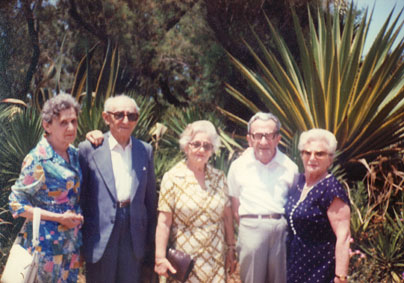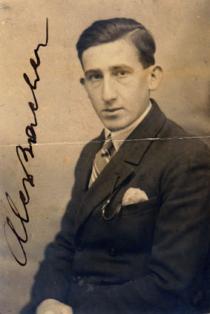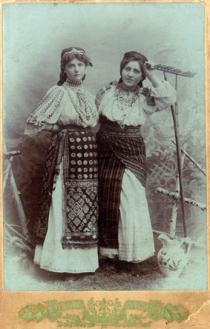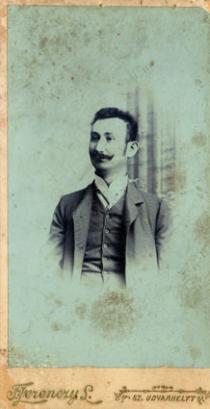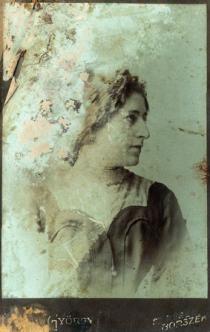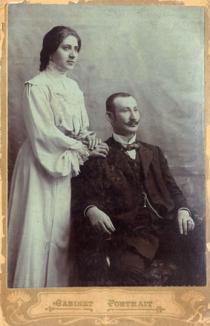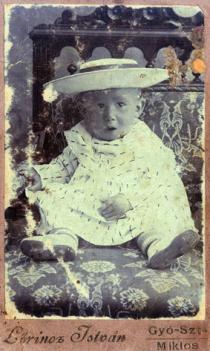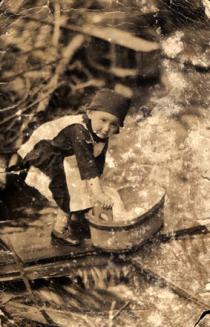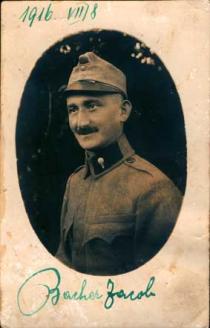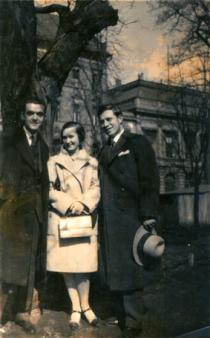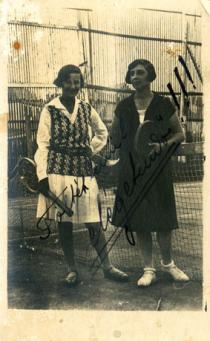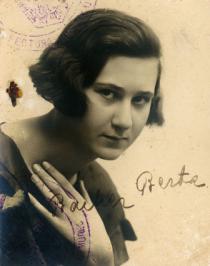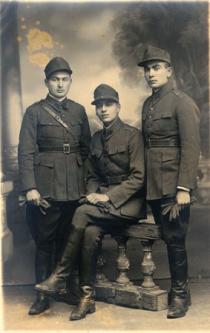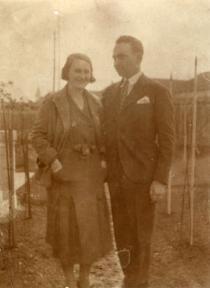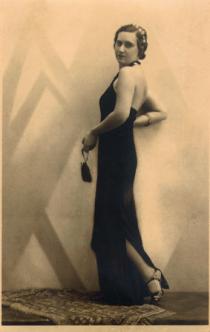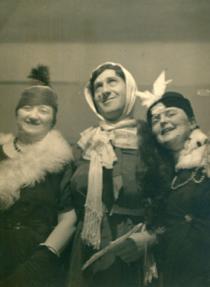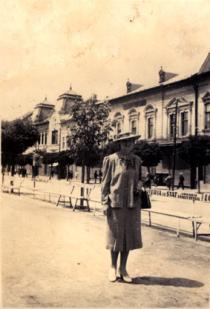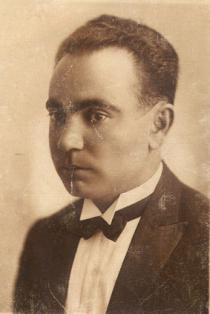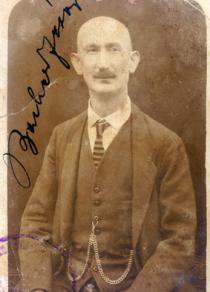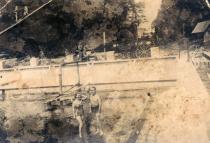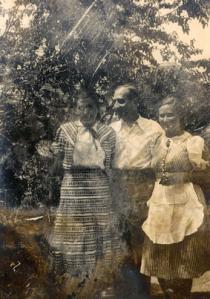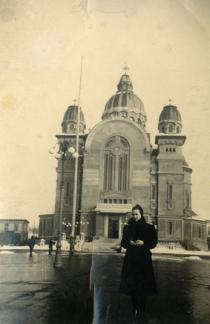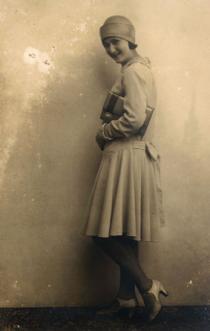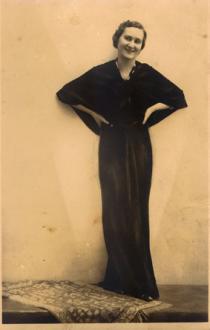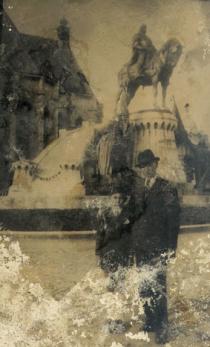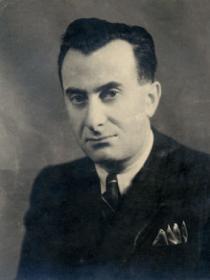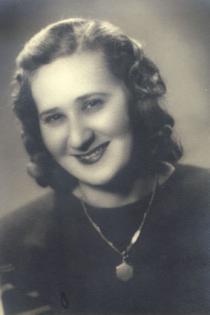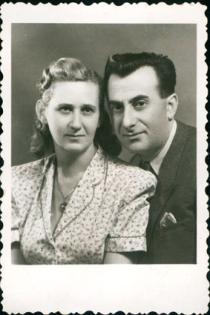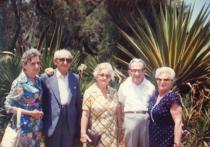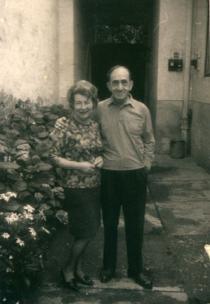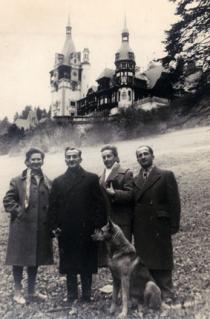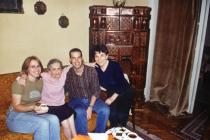This photo was taken in Israel, in Netanya. It was somewhere up, and there was a marvellous walkway all along, and what I liked that the parks weren’t symmetrical, but flowers grew freely, it was marvellous. Palmtrees all along, all kinds. There weren’t symmetric flowerbeds and trees, so that one would feel in a wonderland... The wide walkway led to the seaside. One could go down to the shore on steps. It takes one hour and a half, two hours by car to get there.
The first from right is my sister-in-law, Flora, my husband’s sister, next to her is her husband, Jeno Baruch. The person in the middle is my husband’s cousin, she had just come from India, they fled from Bombay, because the Soviet Union started to gain ground there. They were extremely rich persons. I spent 9 months in Israel. First 6 months, then 3 months. This was during my first visit, in 1975.
My sister-in-law had a proper apartment. She was there for 10 years, maybe even more. She opened a shop, she was a merchant. She had a garments shop, well, with anything a woman needed: bed-clothes, underclothes, bathrobes towels. So a small shop full with stuff. What I noticed in Netanya, that it is a very beautiful seaside town. And what it stroke me that it was written: ‘No bargaining.’ And their acquintances and friends told them: ‘You can close it, because it doesn’t work here. There is no such thing... You won’t be able to sell without bargaining!’ But it worked. It worked very well. And she had a lot of clients. People searched for them a lot. They came at 3 straight to the Baruch shop.
During communism we visited Pest and Israel two times. It wasn't difficult to get our passports, because I had an acquaintance at the Securitate who obtained it for me, and brought it home. When we wanted to travel for the first time, I was so ill, that I couldn't go there to pick up my passport, so he brought it home. I had a girlfriend - a widow, a young and good-looking woman -, and he was her friend. The man wasn't married. And he did it for me, but he came off well. I brought him as much Kent cigarettes that it meant currency then. I brought him special things. I didn't bring as many things even for myself. I got things too, I came with many packages. We were in Pest in 1975. I spent there two weeks and a half, but I know Pest like the back of my hand. However it looked differently after the war. In 1976 we were in Israel, and we were there in 1983 for the last time. We visited my husband's cousin. We stayed only two weeks at aunt Piri in Netanya. We never stayed in hotels [but in cheaper lodgings]. Once I was there for three months, and once for six months uninterruptedly, so I had the chance to get to know it. I saw not only nice things, I saw other things too. It is a very hard-working nation, but one can find human weaknesses and defects, which all nations have. There are enough crooks, there are enough infamous people, but there are also industrious and capable people as well, and they do work. And they built up such a modern state, one couldn't even dream of a better one. I visited the Garden of Gethsemane, the Hill of Calvary, I never saw such a Christian church, though I visited the Capuchin Church in Vienna, the St Stephen's Basilica in Budapest. In Israel there are agencies where they run buses daily, they show this and that, for one day, for two days, you can choose. I was interested in the water of Jordan. I brought water from there in three small bottles for my Christian girlfriends. I had the courage to go down, because one had to descend to get water. I filled the bottles, I entered the church, and I asked the priest to sanctify them. So I did all kind of things. At some other time I spent two weeks in Jerusalem and its surroundings. I saw there the Dome of the Rock and the other [the Church of the Holy Sepulchre]. They are quite close to each other.
In 1994 my husband died. He was buried in the Jewish cemetery of Marosvasarhely. They recited the Kaddish as well, Grunstein was the chazzan then, and he led the ceremony. But let's not talk about this, because it's something that hurts a lot. After so many years, eleven years passed since I lost him, and I still receive respect due to him. Where my husband worked, there were a lot of young people, activists, party members. They still greet me. Because of him. He was such a person, that even after 60 years: 'How are you doing, Missis Steinmetz?' For example a few weeks ago they offered me to bring me fish from the lake. Considering his personality, he was an absolutely fair man.
